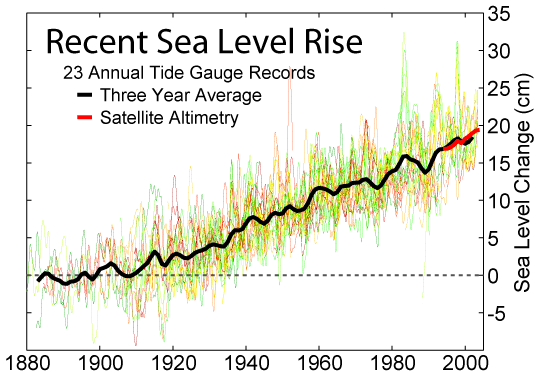Environment & Energy
Related: About this forumIs there a 60-year oscillation in global mean sea level?
This is a paper from Geophysical Research Letters a couple of days ago. The abstract is interesting, though as are the graphs at the bottom. It seems to show that sea level rises in most of the oceans are reaching their peaks and about to start declining, from the way I see in the graphs, within the next 5 years. I'm not going to spend $25 to see the whole article to find out its conclusions, but the following are the key points from the abstract:
- There is a 60-year oscillation in the majority of long tide gauge records
- The signal is consistent in phase and amplitude in many ocean basins
- This has important implications for quantifying sea level acceleration
http://www.agu.org/pubs/crossref/2012/2012GL052885.shtml
AldoLeopold
(617 posts)Being a poor person atm, I can't afford to read this, but the abstract states:
"Although the tide gauge data are still too limited, both in time and space, to determine conclusively that there is a 60-year oscillation in GMSL, the possibility should be considered when attempting to interpret the acceleration in the rate of global and regional mean sea level rise."
I'd really like to see all the data on this. I'm not a geophysicist, but I'm sure I could muddle through. It sounds to me, and I could very well be wrong, that this belongs in the journal of negative results (defunct).
What's problematic, I have found, in breaching conclusions in the various branches of environmental science, is the lack of baseline readings to adequately quantify what we are observing presently. Baseline observations are a sticky subject in ES. That is to say, if the industrial revolution caused or is causing climate change and hence sea level rise, what were our observations prior to the industrial revolution? We go back 60+ years or to say 1880 for readings, and what are we looking at? I believe the abstract concerning "artifact" readings being possible flawed. How do those observations relate to present observations?
What I'm a smidge confused about is what supposedly causes these oscillations? Distortion of the shape of the planet or variation in energy budgets and the absorption of heat into the oceans regarding the specific heat of H2O? I've researched it a bit and am still a bit vague on it.
Very good post. New here, but I hope to post more journal articles like this for the perusal of the community.
caraher
(6,278 posts)but there's some related info from the research group's web pages on tide gauge records and their relationship to global mean sea level.
AldoLeopold
(617 posts)Fascinating stuff. Apparently, tectonic uplift/vertical crustal movements by means of displacement can account for 0.3 mm of rise which appears to be included in the +- error for the generally accepted 3.3 mm +- 0.4 mm annual rise. So they've factored that in and so we have a 2.9 mm rise essentially that may be attributed to melt, expanding water, etc.?
I'm sure it would be a gargantuan and probably impossible task to have real-time undersea topography factored into this for any drastic changes but I'm assuming their modeling coefficents are valid which allow for this 0.3/ 0.4 mm error.
What really grinds my gears is that the climate change doubters are latching on to this like a lamprey. And they're only quoting the parts of the abstract. I perused the interwebs a bit and found along with the ABSTRACT of this journal links to sunspots and cyclic heating and cooling. I still can't find any explanation as to the cause of these oscillations or that it even conclusively exists in the first place.
The freaking Melankovich Cycle results in a cooling period right now - we should be cooling down, not heating up. Energy budgets have already been run and re-run to account for sunspot activity, extra-solar radiation, etc.
caraher
(6,278 posts)The true story is always a lot richer than the cherry-picked factual fragments they cobble together to make their predetermined case. They don't need to make sense, they only need raise doubt in the minds of the credulous and ignorant...
wtmusic
(39,166 posts)Sea level data, of all historical environmental records, is probably subject to the least dispute.
